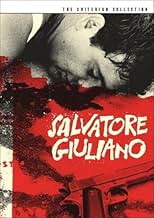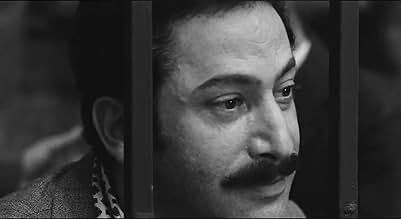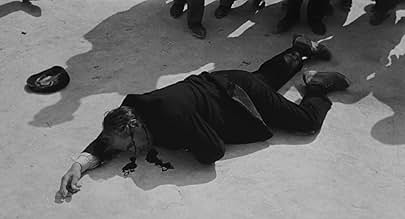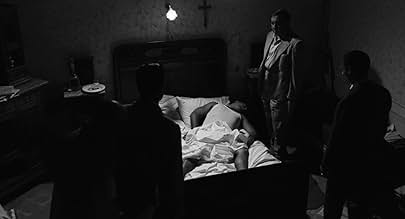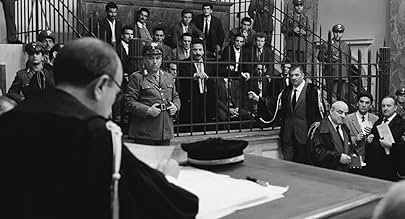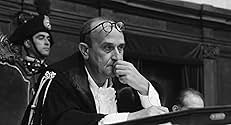NOTE IMDb
7,3/10
5,3 k
MA NOTE
Les méandres nébuleux et compliqués des relations entre le pouvoir gouvernemental, le parti indépendantiste et la mafia dans la Sicile des années 40 culminent avec la mort de Salvatore Giuli... Tout lireLes méandres nébuleux et compliqués des relations entre le pouvoir gouvernemental, le parti indépendantiste et la mafia dans la Sicile des années 40 culminent avec la mort de Salvatore Giuliano.Les méandres nébuleux et compliqués des relations entre le pouvoir gouvernemental, le parti indépendantiste et la mafia dans la Sicile des années 40 culminent avec la mort de Salvatore Giuliano.
- Réalisation
- Scénario
- Casting principal
- Récompenses
- 6 victoires et 4 nominations au total
Frederico Zardi
- Pisciotta's Defense Counsel
- (non crédité)
Pippo Agusta
- Minor Role
- (non crédité)
Sennuccio Benelli
- Reporter
- (non crédité)
Giuseppe Calandra
- Minor Official
- (non crédité)
Pietro Cammarata
- Salvatore Giuliano
- (non crédité)
Max Cartier
- Francesco
- (non crédité)
Nando Cicero
- Bandit
- (non crédité)
Pietro Franzone
- Seperatist
- (non crédité)
Giovanni Gallina
- Bit Part
- (non crédité)
Vincenzo Norvese
- Bit Part
- (non crédité)
Carmelo Oliviero
- Don Nitto Minasola
- (non crédité)
Renato Pinciroli
- Pinciroli
- (non crédité)
Francesco Rosi
- Narrator
- (voix)
- (non crédité)
Giuseppe Teti
- Priest of Montelepre
- (non crédité)
Cosimo Torino
- Frank Mannino
- (non crédité)
Avis à la une
Review of Salvatore Giuliano (1962)
Directed by Francesco Rosi, Salvatore Giuliano (1962) is a gripping, politically charged Italian film that blends the genres of crime drama and historical reconstruction. The film portrays the life and death of Salvatore Giuliano, a real-life Sicilian bandit who became a legendary figure in post-war Italy. Giuliano's story is tragic, marked by his transformation from a rebellious hero to a notorious outlaw and his eventual murder under mysterious circumstances.
Rosi's approach to the material is unique. The film doesn't rely on a traditional narrative structure but instead unfolds in a fragmented, almost documentary-like fashion, presenting the story from various perspectives. This method of storytelling creates a sense of disorientation, mirroring the confusion and corruption of the political and social forces at play in post-WWII Sicily. By juxtaposing the personal tragedy of Giuliano with the larger political landscape of Italy, the film reveals the complex intersections between crime, politics, and the Sicilian mafia.
The performances are strong, with a particularly noteworthy portrayal of Giuliano by Marcello Mastroianni, whose quiet intensity brings depth to a character that is both a symbol of resistance and a product of the violent environment in which he lives. Rosi's direction maintains a cold, observational tone, which works well to emphasize the film's themes of disillusionment and betrayal.
Visually, the film is stunning, with cinematography that captures the stark beauty of the Sicilian landscape while also reflecting the harsh realities of life for the people caught in the web of organized crime and political corruption. The stark black-and-white visuals, coupled with the atmospheric score by Francesco De Masi, enhance the film's somber and tense mood.
Salvatore Giuliano is an excellent example of the political cinema that emerged in Italy during the post-neorealist era. It's not just a crime story; it's an exploration of the corruption and disillusionment that permeated Italian society during the 1940s and '50s. While the film might feel slow or fragmented at times, its depth and ambition make it a fascinating and insightful watch for those interested in the intersection of politics, history, and cinema.
Rating: 4/5 - A thought-provoking, well-crafted historical drama that shines a light on the murky intersection of crime and politics in post-war Sicily.
Directed by Francesco Rosi, Salvatore Giuliano (1962) is a gripping, politically charged Italian film that blends the genres of crime drama and historical reconstruction. The film portrays the life and death of Salvatore Giuliano, a real-life Sicilian bandit who became a legendary figure in post-war Italy. Giuliano's story is tragic, marked by his transformation from a rebellious hero to a notorious outlaw and his eventual murder under mysterious circumstances.
Rosi's approach to the material is unique. The film doesn't rely on a traditional narrative structure but instead unfolds in a fragmented, almost documentary-like fashion, presenting the story from various perspectives. This method of storytelling creates a sense of disorientation, mirroring the confusion and corruption of the political and social forces at play in post-WWII Sicily. By juxtaposing the personal tragedy of Giuliano with the larger political landscape of Italy, the film reveals the complex intersections between crime, politics, and the Sicilian mafia.
The performances are strong, with a particularly noteworthy portrayal of Giuliano by Marcello Mastroianni, whose quiet intensity brings depth to a character that is both a symbol of resistance and a product of the violent environment in which he lives. Rosi's direction maintains a cold, observational tone, which works well to emphasize the film's themes of disillusionment and betrayal.
Visually, the film is stunning, with cinematography that captures the stark beauty of the Sicilian landscape while also reflecting the harsh realities of life for the people caught in the web of organized crime and political corruption. The stark black-and-white visuals, coupled with the atmospheric score by Francesco De Masi, enhance the film's somber and tense mood.
Salvatore Giuliano is an excellent example of the political cinema that emerged in Italy during the post-neorealist era. It's not just a crime story; it's an exploration of the corruption and disillusionment that permeated Italian society during the 1940s and '50s. While the film might feel slow or fragmented at times, its depth and ambition make it a fascinating and insightful watch for those interested in the intersection of politics, history, and cinema.
Rating: 4/5 - A thought-provoking, well-crafted historical drama that shines a light on the murky intersection of crime and politics in post-war Sicily.
"Salvatore.." is more a documentary than a film, in which the story of the legendary sicilian gangster is told. Oddly enough, we never get to see his face, and no insight is given of his character or about how and why did he turn into such an icon for the sicilian people. We only know about him through the other characters in the film. Even though there is some fine acting going on, the direction of Mr.Rosi is downright awful. We are presented with a series of events with no connecting thread whatsoever, other than a logical chronological development. While dealing with an interesting historical moment of Sicily, the film is terribly boring and you need a truckload of patience to stay tuned through the end. If you are keen on studying Sicily's historical heritage, you may find this film interesting, if not, then you should miss it!.
This remarkable movie reminded me of early Eisenstein for the fluid, dynamic
movement of crowds--in the streets, in the movement of soldiers and bandits across the hilly terrain, and in the scene of the Portella della Ginestre massacre. The back-and-forth narrative structure must have influenced Costa-Gavras in the making of "Z." And Rosi's ability to get riveting performances from non-professionals (some of whom could not read scripts) is astonishing. The story line gets confusing, but I think that's because the situation was confusing--multiple betrayals and layers of
corruption and complicity--rather than a flaw in the script or editing. Visually exciting, too--the use of distancing overhead shots, the quiet menace of gunmen walking up a deserted, sun-baked street... memorable stuff.
movement of crowds--in the streets, in the movement of soldiers and bandits across the hilly terrain, and in the scene of the Portella della Ginestre massacre. The back-and-forth narrative structure must have influenced Costa-Gavras in the making of "Z." And Rosi's ability to get riveting performances from non-professionals (some of whom could not read scripts) is astonishing. The story line gets confusing, but I think that's because the situation was confusing--multiple betrayals and layers of
corruption and complicity--rather than a flaw in the script or editing. Visually exciting, too--the use of distancing overhead shots, the quiet menace of gunmen walking up a deserted, sun-baked street... memorable stuff.
Francesco Rosi's cinema are around political matters, a tough subject too swallow for usual cinephiles, due the hard life which we lives are enough to stand, but some facts needs a better understanding as this picture suggests, how Sicily gets his independence from Italy is plentiful explained here, each facts were expose in this overlong picture, but Francesco wisely put forward a cursed triangle of forces, the mob, the separatists and the dangerous outlaws who help them in hope to get their crime's amnesty, after they got Sicily's autonomy starts another hard issue, the communist, such thing was totally inconceivable to Italian standards at it's time, a mass killing was prompt provides by the rich farmers and also by the mob, the Giuliano the leader almost didn't appears on the movie, his second on command and your fellows conrades in-arms were charged by the massacre, interesting picture over this dry land on Italy's south, the mountainous island Sicily !!!
Resume:
First watch: 2019 / How many: 1 / Source: DVD / Rating: 8
Resume:
First watch: 2019 / How many: 1 / Source: DVD / Rating: 8
Filmed in the actual Siciilian locations, this film is a fair attempt to strip away the myth surrounding bandit-cum-revolutionary Giuliano. In fact, he doesn't appear except as a gunned-down corpse at the beginning. The film winds back to unravel the events leading to his death, and forwards to its consequence. This is a clever method of achieving objectivity while at the same time subtly emphasising the man's elusive and mysterious qualities. To show Giuliano would have either been either hagiography or iconoclasm. The film rose above that and broadened its inquiry into the wider social and political context, effectively belittling him as the puppet of various forces jostling for position in Sicily after the war: bandits, police, local aristocracy, the Italian government, communists, and the Mafia.
This sets quite a challenge for itself, partly because of the vacuum at its centre, partly because of the obscurity and complexity of the real events. We are delivered to a chaotic courtroom to try to piece it together. The film finally latches onto Giuliano's lieutenant the only one who seems to know something of what is going on - but even he is silenced. It's all the more disturbing for the confusion.
Rosi is one of the best directors of crowds scenes and he gives raucous energy to any gathering of men, especially in the courtroom. He induces a kind of group hysteria in his actors; they are totally unaware of the camera and the result is an almost disturbing hyper-real feel (real crowds are dull in comparison) it's really something to appreciate. To get into this film, you need to invest something in the passions of the various parties involved - if not sympathise with them, then at least understand them. Without this, the danger is that it all boils down to so much petty bickering. The same might be said of the Godfather, which clearly owes a huge debt to Rosi's style.
Influential then, somewhat brave, with some fine directorial moments, and an interesting history lesson. Hard to actually like, but hard not to admire.
This sets quite a challenge for itself, partly because of the vacuum at its centre, partly because of the obscurity and complexity of the real events. We are delivered to a chaotic courtroom to try to piece it together. The film finally latches onto Giuliano's lieutenant the only one who seems to know something of what is going on - but even he is silenced. It's all the more disturbing for the confusion.
Rosi is one of the best directors of crowds scenes and he gives raucous energy to any gathering of men, especially in the courtroom. He induces a kind of group hysteria in his actors; they are totally unaware of the camera and the result is an almost disturbing hyper-real feel (real crowds are dull in comparison) it's really something to appreciate. To get into this film, you need to invest something in the passions of the various parties involved - if not sympathise with them, then at least understand them. Without this, the danger is that it all boils down to so much petty bickering. The same might be said of the Godfather, which clearly owes a huge debt to Rosi's style.
Influential then, somewhat brave, with some fine directorial moments, and an interesting history lesson. Hard to actually like, but hard not to admire.
Le saviez-vous
- AnecdotesMartin Scorsese credits this film as being one of his many inspirational sources for the look and style of his Taxi Driver (1976).
- GaffesWhen his mother comes to view and identify his corpse, Salvatore's stomach clearly moves as the actor struggles to control his breathing.
- ConnexionsEdited into Il sasso in bocca (1970)
Meilleurs choix
Connectez-vous pour évaluer et suivre la liste de favoris afin de recevoir des recommandations personnalisées
- How long is Salvatore Giuliano?Alimenté par Alexa
Détails
- Date de sortie
- Pays d’origine
- Langue
- Aussi connu sous le nom de
- Wer erschoß Salvatore G.?
- Lieux de tournage
- 98 Via Serafino Mannone, Castelvetrano, Trapani, Sicily, Italie(Giuliano's body)
- Sociétés de production
- Voir plus de crédits d'entreprise sur IMDbPro
- Durée2 heures 3 minutes
- Couleur
- Mixage
- Rapport de forme
- 1.85 : 1
Contribuer à cette page
Suggérer une modification ou ajouter du contenu manquant

Lacune principale
By what name was Salvatore Giuliano (1962) officially released in Canada in English?
Répondre
